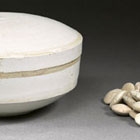J.J. Lally & Co., Oriental Art / New York City, New York
MenuPast Exhibition
Chinese Ceramics in Black and White
March 20–April 10, 2010
24.
A GLAZED WHITE PORCELAIN BOX AND COVER
WITH GAME COUNTERS
Song Dynasty, A.D. 11th–12th Century
of circular outline with wide mouth and close-fitting domed cover, the narrow straight sides of the cover neatly fitted over an inner flange extended up from the unglazed rim of the box, the lower sides of the box sharply angled in to a small rimless circular foot, the flat base recessed and the edge of the foot left unglazed, the remainder of the exterior covered with a transparent glaze, with an oblique line incised across the rims to indicate the correct alignment of the cover; together with 70 small circular cushion-shaped game counters, approximately 29 in pale pinkish-red clay and approximately 41 in buff-white clay.
Diameter 41⁄8 inches (10.5 cm)
Exhibited
Asian Games: The Art of Contest, exhibition organized by the Asia Society, New York, and traveled to the Freer Gallery of Art and Arthur M. Sackler Gallery, Washington D.C. and to the Middlebury College Museum of Art, Middlebury, Vermont, 2004–2005
Published
Mackenzie and Finkel (ed.s), Asian Games: The Art of Contest, New York, 2004, p. 186, no. 15:3
This box and the counters were made for use in the game of Weiqi, an ancient Chinese board game of attack and counter- attack, somewhat similar to chess.
In the chapter by Lo and Wang devoted to weiqi in Asian Games: The Art of Contest, on p. 187, the authors trace the origins of weiqi to the 6th century B.C., cite numerous literary references to the game in Han dynasty texts, and outline the enduring significance of weiqi throughout Chinese history saying, “… from the Tang period (618–907) onward, weiqi was considered an indispensable cultural accomplishment alongside the arts of calligraphy, painting and the playing of the zither. As such, its role in Chinese culture extended far beyond the sphere of games; skill at weiqi, no less than the other accomplishments, was a measure of a person’s claim to a place in the cultured elite of pre-modern China.”
宋 白瓷蓋盒與圍棋子 徑 10.5 厘米
